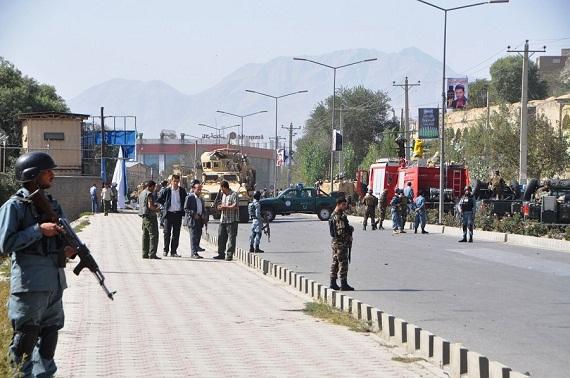HEADLINE
The dwindling chances of a truce in Afghanistan
" Chances of a truce between the Taliban and the Afghan government appear weak after the militants refused to join scheduled peace talks. "

Chances of a truce between the Taliban and the Afghan government appear weak after the militants refused to join scheduled peace talks.
A four-nation group, the Quadrilateral Coordination Group, comprised of the U.S China, Pakistan and Afghanistan had asked the Taliban to lay down arms and join the peace process this month.
Asia Calling correspondent Shadi Khan Saif reports on how ordinary Afghans feel about the talks as yet another season of war looms over the country.
Scores of checkpoints like this one are part of a so-called “Ring of Steel”, securing Kabul from any terrorist threat.
Kabul; the capital of war-torn Afghanistan is bracing for yet another “Season of War” that is likely to be announced by the Taliban in the coming days.
It has been like this for more than a decade now, when the Taliban announce a year of bloodshed during spring, or April.
Following months of political wrangling and high-level diplomacy, officials sent a clear message to the Taliban that talks remain the best way to settle the conflict.
The Afghan Foreign Minister Salahuddin Rabbani made the offer.
“There should be no doubt in anyone’s mind — Taliban or otherwise — that the Afghan people and government are serious and sincere in seeking a political resolution to the ongoing conflict in Afghanistan with all its internal and external dimensions,” says Rabbani.
Minister Rabbani also said the government will continue to defend Afghanistan and fight against forces “bent on turning the clock back” on the country’s achievements.
However, the call was abruptly rejected by the Taliban, which has declared that as long as foreign troops remain in the country, they will keep fighting.
Esmatullah, a member of the Afghan National Police (ANP) who is helping to secure Kabul’s “Ring of Steel” says that regardless of the political dimensions of the conflict, he is committed to safeguarding his people.
“For me it is crystal clear, I will not allow anyone to come with deadly material and create havoc,” he says, “This is what my religion and my nation has taught me to do.”
Meanwhile, life moves on in the capital.
Downtown in the Kabul Bazaar, Afghans are busy with their day to day activities.
Khailil Ahmad, a university student told me that people in the city are relatively well-off in terms of peace, but they are aware of the ongoing fighting elsewhere in the country.
“I have personally known a number of families in the restive southern districts who have fled their homes due to violence and are now living in shelters or are forced to break into empty houses in relatively safe places in the country,” explains Ahmad.
In the first half of last year there were almost 5,000 casualties.
According to the United Nations Assistance Mission in Afghanistan (UNAMA) the vast majority – or 90 per cent – of civilian casualties resulted from ground engagements and improvised explosive devices. The UNAMA hold anti-government forces responsible for most of the damage, suicide attacks and targeted killings.
In the recent months, terror attacks have not sparred Kabul either. Farishta Ahmadi, a university student shared how she feels about living in the capital.
“We had some hopes associated with the peace talks; there was a hope for truce,” she says, “Many families have moved from various provinces to Kabul for refuge but Kabul is not safe either, there are blasts and fighting here as well.”
In eyes of analysts, the conflict in Afghanistan has complicated roots.
And critics blame neighboring Pakistan for allowing the Taliban to flourish under their watch.
Humera Hakmal, a women’s rights and peace activist says that might be a factor.
But there is a great need for reforms inside Afghanistan too.
“It is very regrettable to see that Afghanistan remains one of the most corrupt countries in the world, this corruption that has penetrated all segments of the society that compels people in the areas under the Taliban’s influence to seek justice from the Taliban’s speedy courts,” says Hakmal.
Despite the Taliban’s refusal to join the peace talks, the Afghan government has expressed determination to push for a peaceful solution as the conflict enters its 15th year running.
- Shadi Khan Saif
- Afghan peace talk
- foreign troops in Afghan
- eng
- Taliban Afghanistan
Komentar (0)
KBR percaya pembaca situs ini adalah orang-orang yang cerdas dan terpelajar. Karena itu mari kita gunakan kata-kata yang santun di dalam kolom komentar ini. Kalimat yang sopan, menjauhi prasangka SARA (suku, agama, ras dan antargolongan), pasti akan lebih didengar. Yuk, kita praktikkan!